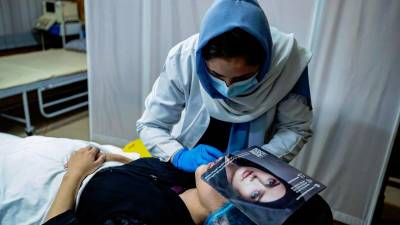KABUL: Cosmetic surgery clinics in Afghanistan’s capital offer a stark contrast to the austerity of Taliban rule with their fake crystal chandeliers and velvet sofas.
Despite the country’s strict theocratic governance and widespread poverty, approximately 20 clinics in Kabul have prospered since the end of decades of conflict.
Foreign doctors primarily from Turkey travel to Kabul to train local practitioners, who also complete internships in Istanbul while importing equipment from Asia and Europe.
Waiting rooms typically feature affluent clients including men experiencing hair loss alongside predominantly female patients.
Women clients often wear heavy makeup beneath their mandatory head-to-toe coverings, with some opting for the full burqa.
Twenty-five-year-old Silsila Hamidi decided to undergo her second facelift, believing stress from being an Afghan woman had damaged her skin.
“Even if others can’t see us, we see ourselves: looking beautiful in the mirror gives us energy,“ Hamidi stated before her procedure to address sagging facial skin.
The medical school graduate indicated her skin suffered from “many pressures” facing Afghan women without providing specific details.
Taliban restrictions have severely limited women’s access to employment and prohibited long-distance travel without male guardians.
Women cannot raise their voices outside the home and face bans from universities, parks, and gyms under current regulations.
While cosmetic surgeries flourish, the Taliban government has banned beauty parlours and hair salons catering to female clients.
“If they were open… our skin wouldn’t be in this state, we wouldn’t need surgery,“ remarked Hamidi, who underwent facial work at age 23.
The Taliban authorities typically forbid physical alterations based on their interpretation of Islamic law but haven’t responded to multiple requests for comment regarding cosmetic procedures.
Sector professionals assert these practices remain permitted because they qualify as medical treatments.
Clinic workers confirmed government non-interference in their operations, though morality police enforce gender segregation requirements.
Some industry insiders claim even Taliban members seek these services at the clinics.
“Here, having no hair or beard is considered a sign of weakness,“ explained Sajed Zadran, deputy director of the Negin Asia clinic featuring Chinese-made equipment.
Since the Taliban mandated fist-length beards for men, transplants have grown fashionable according to Bilal Khan of EuroAsia clinic.
Khan added that some clients “borrow money to have hair before their wedding” despite not all being wealthy.
Methods used in converted villa clinics match international standards and pose “no risk” according to dermatologist Abdul Nassim Sadiqi.
Procedures cost between $43 and $87 for Botox and $260 to $509 for hair implants at these facilities.
These sums represent significant expenses in a country where nearly half the population lives in poverty according to World Bank data.
London-based Afghan restaurateur Mohammed Shoaib Yarzada found the procedures more affordable than British prices during his first visit home in 14 years.
“When I enter the clinic, it’s as if I am abroad, in Europe,“ Yarzada observed regarding his scalp treatment.
Clinics aggressively promote beauty promises through social media channels featuring smoothed skin, plump lips, and abundant hair.
Social media influencers impact Afghan trends similarly to Western markets according to Negin Asia co-director Lucky Khaan.
“Many patients come without real problems but want to have surgery because they have seen trends on Instagram,“ noted the Russian doctor of Afghan origin.
The surgeon added that some individuals “who lack money for food, prefer to invest in their beauty” despite widespread hunger and inadequate medical care. – AFP
